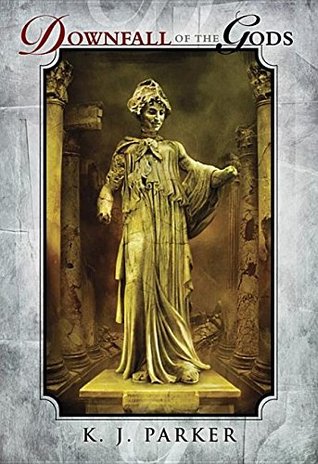Estoy siempre pendiente de las nuevas publicaciones de K. J. Parker, su estilo de fantasía y su sentido del humor me gustan mucho, y se prodiga en un formato que se está convirtiendo en mi favorito, la novela breve. Ya comenté en una entrada anterior un par de sus obras. Hoy repito estilo de entrada y comentaré un par más. Muchas de sus novelas están ubicadas en un mismo universo, pero su lectura es independiente, podéis comenzar por la que más os apetezca.
 Mightier than the sword es su última obra. Seguramente es la que me ha gustado menos de todas las que he leído. Creo que para la idea que quería desarrollar el formato de novela breve se queda corto (el final es muy apresurado) y la historia no está tan bien enlazada como en la mayoría de sus obras, aunque contiene momentos realmente divertidos.
Mightier than the sword es su última obra. Seguramente es la que me ha gustado menos de todas las que he leído. Creo que para la idea que quería desarrollar el formato de novela breve se queda corto (el final es muy apresurado) y la historia no está tan bien enlazada como en la mayoría de sus obras, aunque contiene momentos realmente divertidos.
El protagonista es un legado imperial, sobrino de la emperatriz vigente, que debe investigar y solucionar los ataques que están sufriendo algunos de los monasterios del Imperio por parte de los piratas.
Mientras seguimos sus correrías por el territorio y sus investigaciones conocemos parte de la historia de su familia y los métodos por los cuales llegó al poder y se mantiene en él.
La disparatada vida sentimental del protagonista y las corruptelas de los nobles de las provincias son algunos de los aspectos más divertidos de la trama. Aunque tenga partes interesantes la lectura no acabó de satisfacerme y quede un poco decepcionado, así que, para quitarme el mal gusto de boca, me dispuse a leer otra de sus novelas breves.
 The last witness si que tiene todas las virtudes a las que nos tiene acostumbrados K. J. Parker: originalidad, sentido del humor, y aspectos que generan reflexión.
The last witness si que tiene todas las virtudes a las que nos tiene acostumbrados K. J. Parker: originalidad, sentido del humor, y aspectos que generan reflexión.
La premisa de la novela es que el protagonista tiene la capacidad de borrar fragmentos de la memoria de las personas. Visualiza las mentes humanas como enormes bibliotecas, de las cuales puede eliminar algunos libros o pergaminos que contienen recuerdos, pero en el proceso él se queda con los recuerdos que borra. El título de la historia hace referencia a que se convierte en el ultimo testigo de algunos hechos que han sucedido, y que si él desaparece, es como si el suceso no hubiese acontecido.
Las habilidades del protagonista son conocidas, y recibe encargos de diversa índole: desde gente humilde que quiere borrar sus momentos dolorosos a criminales que quieren borrar las huellas de sus fechorías.
La historia es compleja y elaborada, a momentos difícil de seguir, con varios giros inesperados en la trama, y con muy mala leche. Me ha dejado muy satisfecho y con ganas de seguir leyendo la obra de este fantástico autor.
Es una lástima que sólo haya una de sus historias disponible en castellano, la encontraréis en el blog Cuentos para Algernon. A ver si alguna editorial se anima y saca una colección de sus novelas breves, creo que sería una apuesta original y atrevida. Cuentan con un comprador.
















